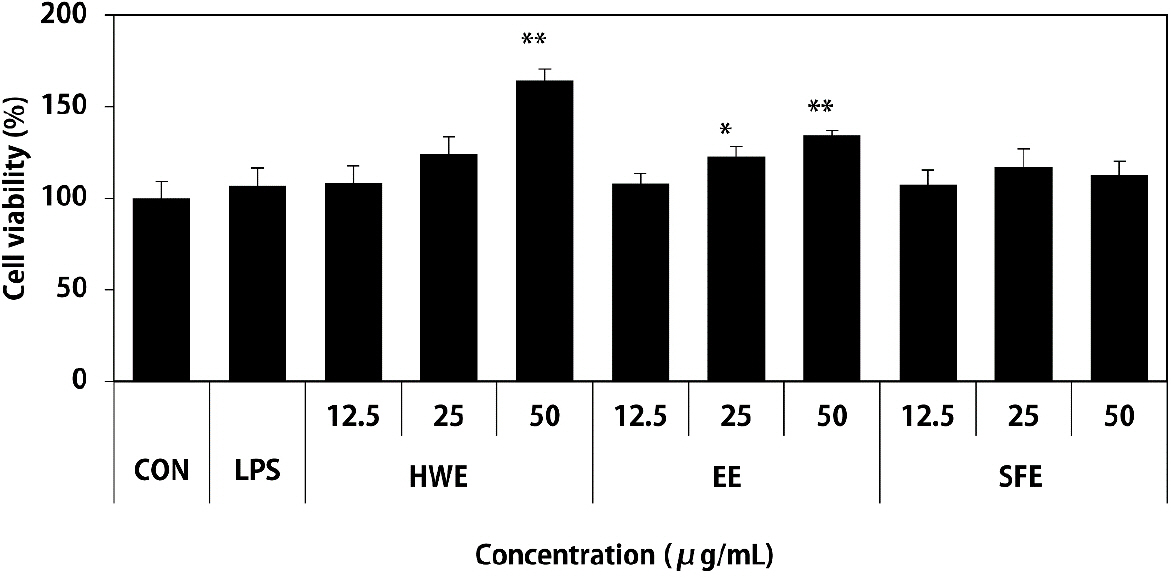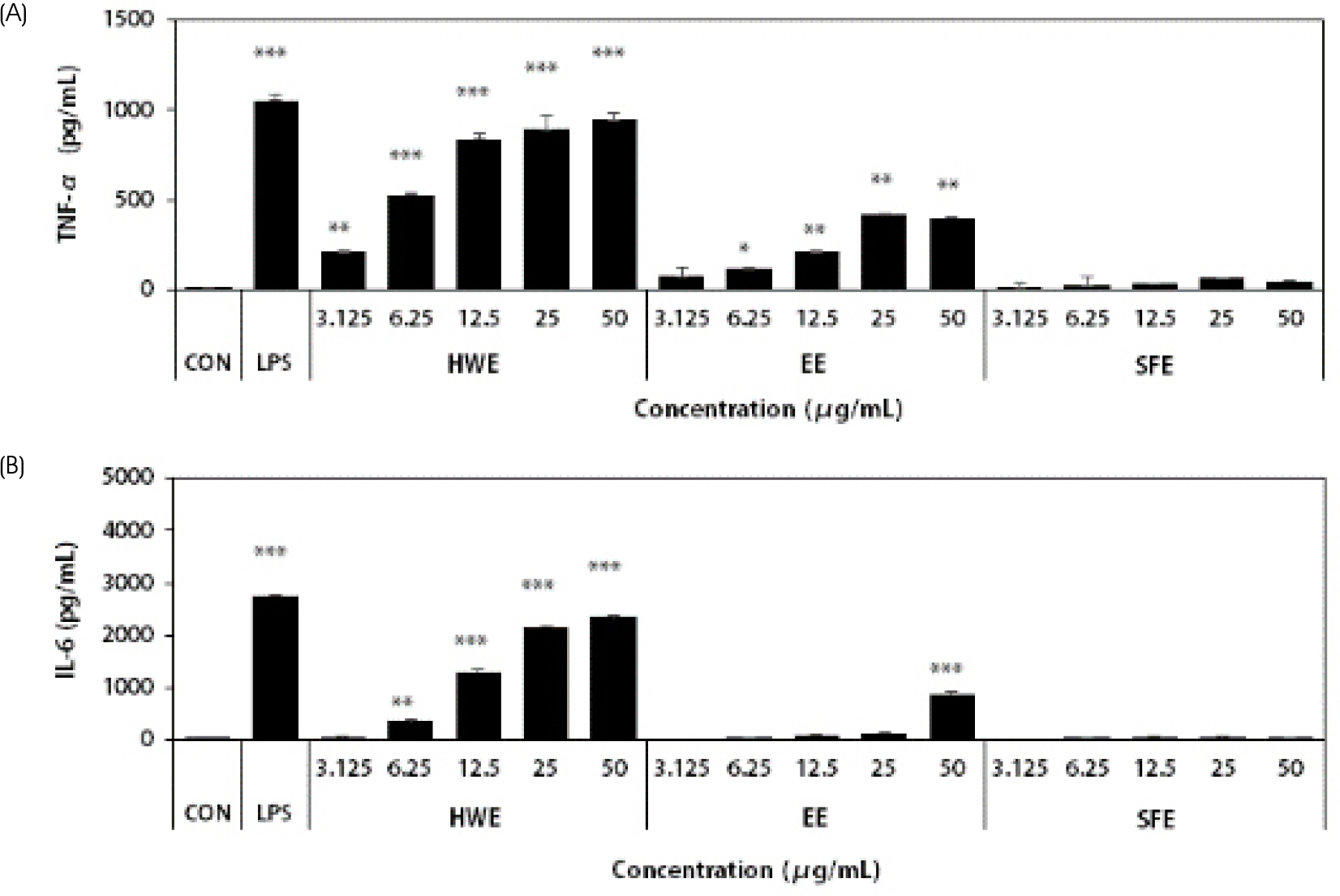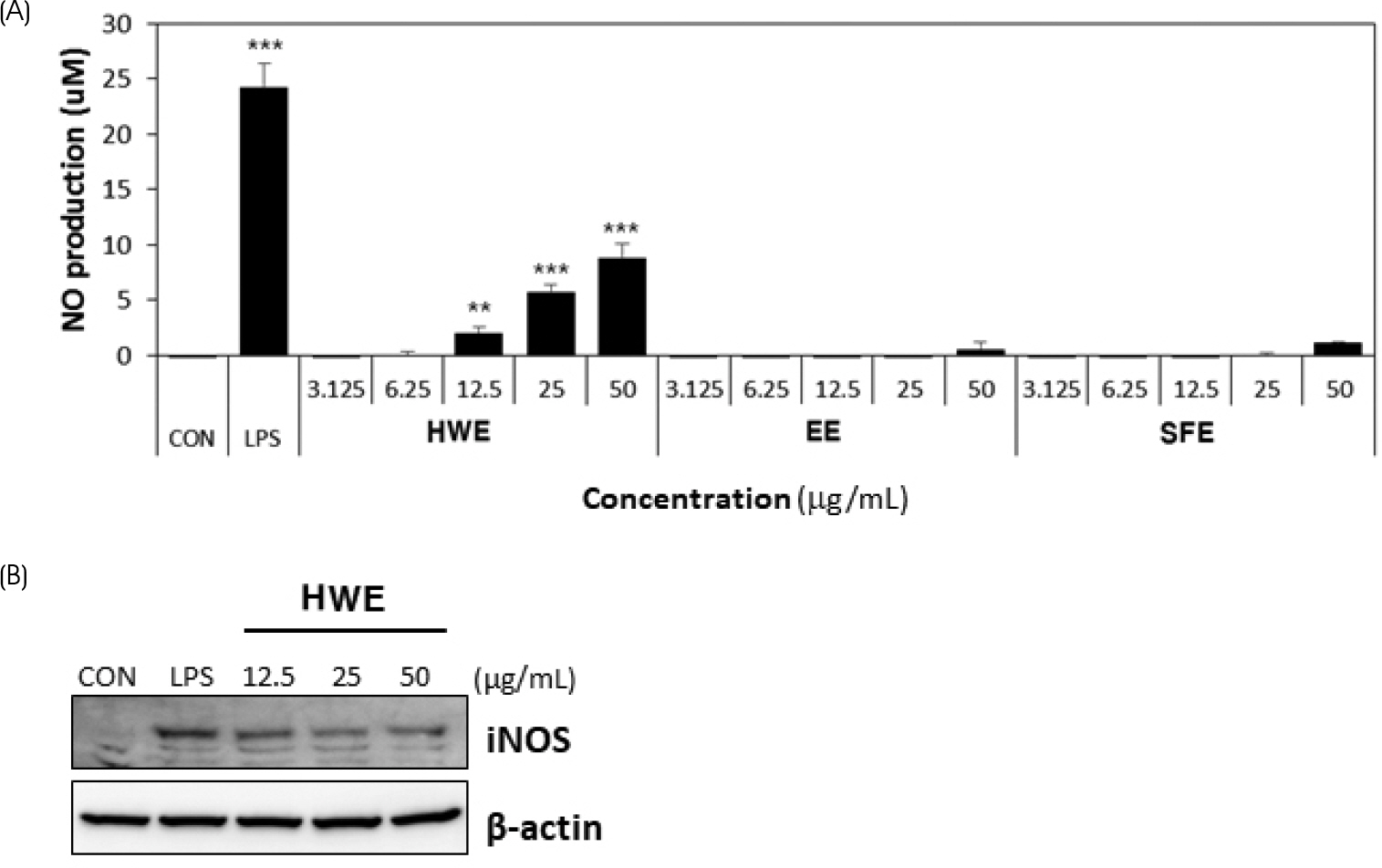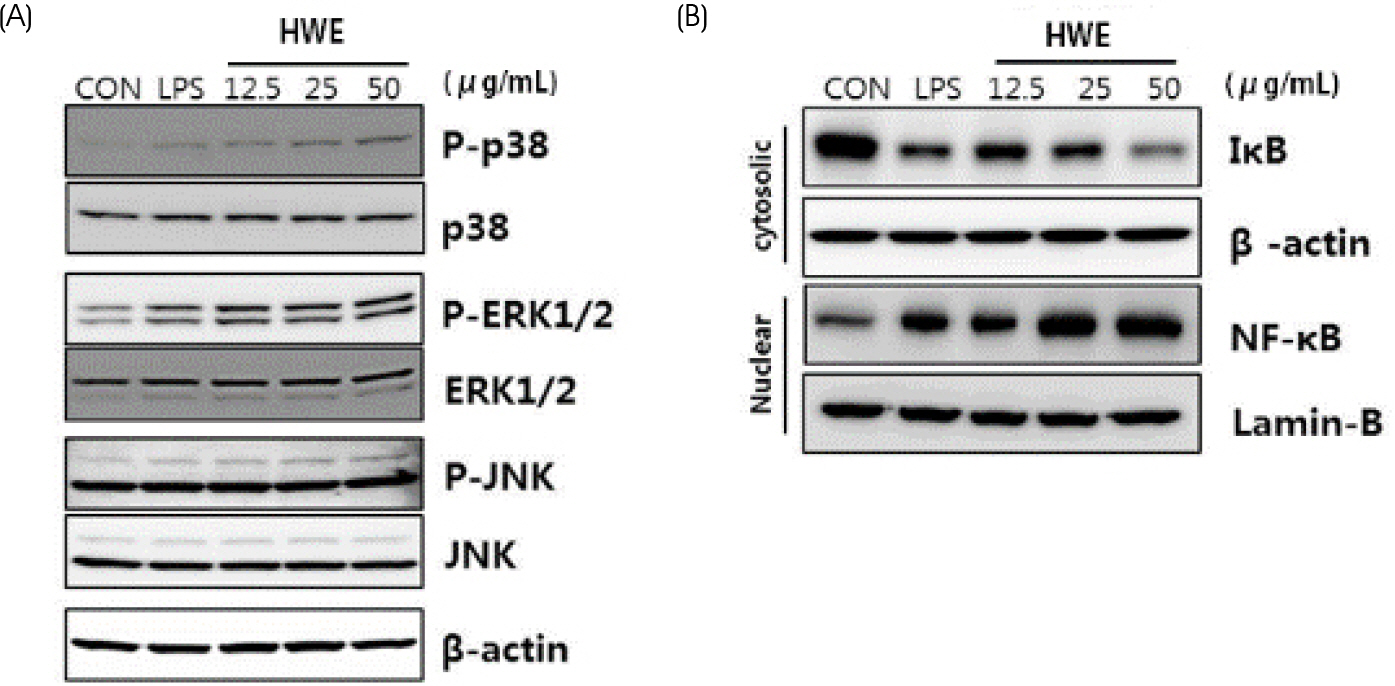J Nutr Health.
2018 Dec;51(6):507-514. 10.4163/jnh.2018.51.6.507.
Immunomodulating activity of Sargassum horneri extracts in RAW264.7 macrophages
- Affiliations
-
- 1Division of Natural Product Research, Korea Prime Pharmacy CO., LTD., Jeonnam 58144, Korea.
- 2Department of Food and Nutrition, Chungnam National University, Daejeon 34134, Korea. kakim@cnu.ac.kr
- KMID: 2455839
- DOI: http://doi.org/10.4163/jnh.2018.51.6.507
Abstract
- PURPOSE
Sargassum horneri (S. horneri) is a species of brown macroalgae that is common along the coast of Japan and Korea. The present study investigated the immuno-modulatory effects of different types of S. horneri extracts in RAW264.7 macrophages.
METHODS
S. horneri was extracted by three different methods, hot water extraction, 50% ethanol extraction, and supercritical fluid extraction. Cell viability was then measured by MTT assay, while the production levels of tumor necrosis factor-α (TNF-α), interleukin-6 (IL-6), and nitric oxide (NO) were measured by enzyme-linked immunosorbent assay and Griess assay, respectively. The expression and activation levels of inducible NO synthase (iNOS), mitogen-activated protein kinase (MAPK) and nuclear factor κB (NF-κB) were examined by western blot analysis.
RESULTS
The three different S. horneri extracts were nontoxic against RAW 264.7 cells up to 50 µg/mL, among which treatment with hot water extract (HWE) of S. horneri significantly enhanced the production of TNF-α, IL-6, and NO in a dose-dependent manner. Hot water extract of S. horneri also increased the expression level of iNOS, suggesting that up-regulation of iNOS expression by HWE of S. horneri was responsible for the induction of NO production. In addition, treatment of RAW 264.7 macrophages with HWE of S. horneri increased the phosphorylation levels of ERK, p38 and JNK. Furthermore, the activation and subsequent nuclear translocation of NF-κB was enhanced upon treatment with HWE of S. horneri, indicating that HWE of S. horneri activates macrophages to secrete TNF-α, IL-6 and NO and induces iNOS expression via activation of the NF-κB and MAPKs signaling pathways.
CONCLUSION
Taken together, these findings suggest that HWE of S. horneri possesses potential as a functional food with immunomodulatory activity.
Keyword
MeSH Terms
-
Blotting, Western
Cell Survival
Chromatography, Supercritical Fluid
Cytokines
Enzyme-Linked Immunosorbent Assay
Ethanol
Functional Food
Interleukin-6
Japan
Korea
Macrophages*
Necrosis
Nitric Oxide
Nitric Oxide Synthase
Phosphorylation
Protein Kinases
RAW 264.7 Cells
Sargassum*
Seaweed
Up-Regulation
Water
Cytokines
Ethanol
Interleukin-6
Nitric Oxide
Nitric Oxide Synthase
Protein Kinases
Water
Figure
Cited by 1 articles
-
Splenocyte-mediated immune enhancing activity of Sargassum horneri extracts
Dong-Sub Kim, Nak-Yun Sung, In-Jun Han, Byung-Soo Lee, Sang-Yun Park, Eun Young Nho, Ji Eom, Geon Kim, Kyung-Ah Kim
J Nutr Health. 2019;52(6):515-528. doi: 10.4163/jnh.2019.52.6.515.
Reference
-
References
1. Cha JH, Lim EM. Effects of Gardeniae fructus on cytokines in mouse macrophage. J Korean Obstet Gynecol. 2014; 27(1):1–16.
Article2. Erwig LP, Rees AJ. Macrophage activation and programming and its role for macrophage function in glomerular inflammation. Kidney Blood Press Res. 1999; 22(1–2):21–25.3. Jiang MH, Zhu L, Jiang JG. Immunoregulatory actions of polysaccharides from Chinese herbal medicine. Expert Opin Ther Targets. 2010; 14(12):1367–1402.
Article4. Yuan H, Song J, Li X, Li N, Dai J. Immunomodulation and antitumor activity of kappa-carrageenan oligosaccharides. Cancer Lett. 2006; 243(2):228–234.5. Hong HD, Cho CW, Rhee YK, Choi HD, Lee HS. Status of technology development using immune-modulating polysaccharide. Food Sci Ind. 2012; 45(1):2–11.6. Yan C, Yin Y, Zhang D, Yang W, Yu R. Structural characterization and in vitro antitumor activity of a novel polysaccharide from Taxus yunnanensis. Carbohydr Polym. 2013; 96(2):389–395.
Article7. Brown ES, Allsopp PJ, Magee PJ, Gill CI, Nitecki S, Strain CR, McSorley EM. Seaweed and human health. Nutr Rev. 2014; 72(3):205–216.
Article8. Kim NG. Effects of temperature, photon irradiance, and photoperiod on the growth of embryos of Sargassum horneri in laboratory culture. Korean J Fish Aquat Sci. 2015; 48(1):76–81.
Article9. Liu L, Heinrich M, Myers S, Dworjanyn SA. Towards a better understanding of medicinal uses of the brown seaweed Sargassum in Traditional Chinese Medicine: a phytochemical and pharmacological review. J Ethnopharmacol. 2012; 142(3):591–619.
Article10. Preeprame S, Hayashi K, Lee JB, Sankawa U, Hayashi T. A novel antivirally active fucan sulfate derived from an edible brown alga, Sargassum horneri. Chem Pharm Bull (Tokyo). 2001; 49(4):484–485.
Article11. Matsumura Y. Nutrition trends in Japan. Asia Pac J Clin Nutr. 2001; 10(Suppl):S40–S47.
Article12. Food and Agriculture Organization of the United Nations (IT). A guide to the seaweed industry: FAO fisheries technical paper 441. 8. Seaweeds used as human food [Internet]. Rome: Food and Agriculture Organization of the United Nations;2003. [cited 2018 Dec. 16]. Available from:. http://www.fao.org/docrep/006/y4765e/y4765e0b.htm.13. Cardoso SM, Pereira OR, Seca AM, Pinto DC, Silva AM. Seaweeds as preventive agents for cardiovascular diseases: from nutrients to functional foods. Mar Drugs. 2015; 13(11):6838–6865.
Article14. Yamaguchi M. Regulatory mechanism of food factors in bone metabolism and prevention of osteoporosis. Yakugaku Zasshi. 2006; 126(11):1117–1137.
Article15. Shao P, Chen X, Sun P. Chemical characterization, antioxidant and antitumor activity of sulfated polysaccharide from Sargassum horneri. Carbohydr Polym. 2014; 105:260–269.
Article16. Shao P, Liu J, Chen X, Fang Z, Sun P. Structural features and antitumor activity of a purified polysaccharide extracted from Sargassum horneri. Int J Biol Macromol. 2015; 73:124–130.
Article17. Yoshimura A. Signal transduction of inflammatory cytokines and tumor development. Cancer Sci. 2006; 97(6):439–447.
Article18. Schorey JS, Cooper AM. Macrophage signalling upon mycobacterial infection: the MAP kinases lead the way. Cell Microbiol. 2003; 5(3):133–142.
Article19. Gaestel M, Mengel A, Bothe U, Asadullah K. Protein kinases as small molecule inhibitor targets in inflammation. Curr Med Chem. 2007; 14(21):2214–2234.
Article20. Yoon TJ. Effect of water extracts from root of Taraxacum officinale on innate and adaptive immune responses in mice. Korean J Food Nutr. 2008; 21(3):275–282.21. Izadpanah K, Freyer D, Weber JR, Braun JS. Brain parenchymal TNF-α and IL-1β induction in experimental pneumococcal meningitis. J Neuroimmunol. 2014; 276(1–2):104–111.
Article22. Byun EH. Comparison study of immunomodulatory activity of polysaccharide and ethanol extracted from Sargassum fulvellum. J Korean Soc Food Sci Nutr. 2015; 44(11):1621–1628.
Article23. Cha JH, Kim YS, Lee EM. Effects of Prunellae spica water extract on immune response in macrophage cells. J Orient Obstet Gynecol. 2010; 23(3):91–100.24. Chiou WF, Chou CJ, Chen CF. Camptothecin suppresses nitric oxide biosynthesis in RAW 264.7 macrophages. Life Sci. 2001; 69(6):625–635.
Article25. Hibbs JB Jr, Taintor RR, Vavrin Z, Rachlin EM. Nitric oxide: a cytotoxic activated macrophage effector molecule. Biochem Biophys Res Commun. 1988; 157(1):87–94.
Article26. Aderem A, Ulevitch RJ. Toll-like receptors in the induction of the innate immune response. Nature. 2000; 406(6797):782–787.
Article27. Rosadini CV, Kagan JC. Early innate immune responses to bacterial LPS. Curr Opin Immunol. 2017; 44:14–19.
Article28. Fukao T, Koyasu S. PI3K and negative regulation of TLR signaling. Trends Immunol. 2003; 24(7):358–363.
Article29. Peroval MY, Boyd AC, Young JR, Smith AL. A critical role for MAPK signalling pathways in the transcriptional regulation of toll like receptors. PLoS One. 2013; 8(2):): e51243.
Article30. Medzhitov R, Preston-Hurlburt P, Janeway CA Jr. A human homologue of the Drosophila Toll protein signals activation of adaptive immunity. Nature. 1997; 388(6640):394–397.
Article31. Kim ME, Jung YC, Jung I, Lee HW, Youn HY, Lee JS. Anti-inflammatory effects of ethanolic extract from Sargassum horneri (Turner) C. Agardh on lipopolysaccharide-stimulated macrophage activation via NF-κB pathway regulation. Immunol Invest. 2015; 44(2):137–146.
- Full Text Links
- Actions
-
Cited
- CITED
-
- Close
- Share
- Similar articles
-
- Splenocyte-mediated immune enhancing activity of Sargassum horneri extracts
- Inhibitory effects of Sargassum horneri extract against endoplasmic reticulum stress in HepG2 cells
- Anti-inflammatory activity of a sulfated polysaccharide isolated from an enzymatic digest of brown seaweed Sargassum horneri in RAW 264.7 cells
- Enhancing Effect of Zingiber Officinale Roscoe Extracts on Mouse Spleen and Macrophage Cells Activation
- Recombinant Rv0753c Protein of Mycobacterium tuberculosis Induces Apoptosis Through Reactive Oxygen Species-JNK Pathway in Macrophages





